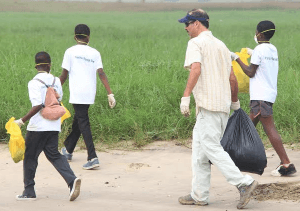Reflections on Earth Day 2015

As the 45th observance of Earth Day approaches, I wanted to reflect on the significance of this year’s theme, “It’s Our Turn to Lead”. Our world is under unprecedented threat. Climate change is rapidly altering the environment on an extraordinary scale with oceans rising, and ecosystems changing forever. Illegal, unregulated and unreported fishing is emptying our oceans of sustenance on which literally billions of people depend. Habitat loss, poaching and wildlife trafficking threaten not only iconic species such as elephants and rhinoceros, but lesser known ones like pangolins and monk seals.
Here in Ghana and throughout West Africa the situation is perhaps even more critical. Growing seasons and rains are becoming increasingly unreliable, threatening farmers and their livelihoods; rivers that provide drinking water to millions are spoiled by rampant illegal mining using dangerous chemicals; beaches and fishermen’s nets are clogged with plastic bags; forests are disappearing at an alarming rate. Bush meat poached from nature reserves is sold openly, threatening biodiversity and public health with diseases such as Ebola.
It’s easy to become disheartened with the troubling news that greets us daily. But we mustn’t succumb to this temptation. Instead, I urge all to take this year’s slogan “It’s Our Turn to Lead” to heart. It is both our turn and our obligation to future generations. At this critical juncture for the world’s climate and biodiversity, if we don’t start taking action now it will quickly become be too late.
So, whether young or old, poor or rich, each of us can help lead a movement to reverse this tide of environmental degradation. Each of us can begin on Earth Day to transform the current grim reality through our actions. Environmental leadership can start small – discuss conservation with your family or turn off the water when you brush your teeth; or gather a group to clean a beach or encourage your elected representative to act on an environmental issue. Write to your local newspaper, plant a tree or hold a meeting in your local community. Each action shows your leadership and encourages others to do the same.
Like Ghana and Ghanaians, America is also committed to environmental leadership through our actions. In Ghana our programs in the north and west support sustainable natural resource management both on land and in the ocean. Further afield, the United States recently announced an ambitious target to cut our carbon emissions by 26-28% below 2005 levels by 2025. We provide significant funds to support forests in developing countries, with the goal of reducing emissions from deforestation and promoting sustainable agriculture. In November 2014, President Obama announced our intention to contribute $3 billion to the Green Climate Fund (GCF) to reduce carbon pollution and strengthen resilience in developing countries.
So I urge all to take your turn leading the fight against climate change, wildlife trafficking, environmental degradation or any other environmental threat in any way you can. It is taking action, and not necessarily the action you take that will matter most in leading Ghana and the world to a sustainable and better future.
By Sam Healy,
Regional Environmental Officer, U.S. Embassy
